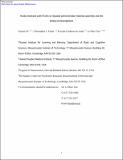Hook3 interacts with PCM1 to regulate pericentriolar material assembly and the timing of neurogenesis
Author(s)
Ge, Xuecai; Frank, Christopher Lee; Calderon de Anda, Froylan; Tsai, Li-Huei
DownloadTsai_Hook3 Interacts (rev without p.1).pdf (1.462Mb)
PUBLISHER_POLICY
Publisher Policy
Article is made available in accordance with the publisher's policy and may be subject to US copyright law. Please refer to the publisher's site for terms of use.
Terms of use
Metadata
Show full item recordAbstract
Centrosome functions are important in many brain developmental processes. Proper
functioning of the centrosome relies on assembly of protein components into the pericentriolar
material. This dynamic assembly is mediated by the trafficking of pericentriolar satellites, which are
comprised of centrosomal proteins. Here we demonstrate that trafficking of pericentriolar satellites
requires the interaction between Hook3 and Pericentriolar Material 1 (PCM1). Hook3, previously
shown to link the centrosome and the nucleus in C. elegans, is recruited to pericentriolar satellites
through interaction with PCM1, a protein associated with schizophrenia. Knocking down of Hook3 or
PCM1, or disrupting the Hook3-PCM1 interaction in vivo impairs interkinetic nuclear migration, a
featured behavior of embryonic neural progenitors. This in turn leads to overproduction of neurons
and premature depletion of the neural progenitor pool in the developing neocortex. These results
underscore the importance of centrosomal assembly in neurogenesis, and provide potential insights
into the etiology of brain developmental diseases related to centrosome dysfunction.
Date issued
2010-01Department
Massachusetts Institute of Technology. Department of Brain and Cognitive Sciences; Picower Institute for Learning and MemoryJournal
Neuron
Publisher
Elsevier
Citation
Ge, Xuecai, et al. "Hook3 interacts with PCM1 to regulate pericentriolar material assembly and the timing of neurogenesis." Neuron, 65:2, 28 January 2010, Pages 191–203.
Version: Author's final manuscript
ISSN
0896-6273
1097-4199